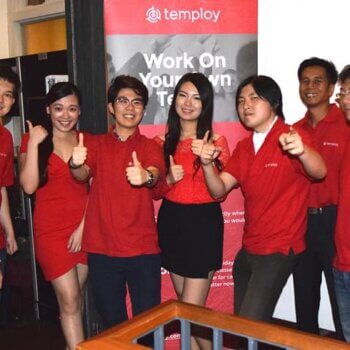(Women on Top in Tech is a series about Women Founders, CEOs, and Leaders in technology. It aims to amplify and bring to the fore diversity in leadership in technology.)
Debbie is one of Asia’s top media and start-up minds who founded TechStorm, Asia’s fastest-growing NextGen media powerhouse on the thematics of tech, entrepreneurship and Asian eSports for consumers. TechStorm is available across Southeast Asia reaching 21,300,000 audience access in less than three months of its commercialization.
She is an accomplished international businesswoman with a track record of commercial success across 20 cities around the world. She also serves as a Committee Member with Singapore’s prestigious business leadership community SCCCI-CWG on a pro bono basis to support women in business.
What makes you do what you do?
I am fired by passion and driven by a hunger to create change. I move forward, I move on and I do not look back. TechStorm is born out of a deep desire to champion the stories of entrepreneurship, technology, and eSports from Asia and be the global voice for the unsung heroes of these rising sectors. It is time to show the world what Asia can do and what the Asian perspectives are about. The mission behind TechStorm is way larger than just me as the Founder and the global impact we could have will be unstoppable.
How did you rise in the industry you are in?
I did a hard pivot to technology and entered the tech sector fuelled by passion, not by training. My knowledge about technology came through to me from a lot of learning, a lot of time spent seeking to understand the sector, I read extensively and it is by meeting a lot of industry stakeholders who were willing to share their knowledge with me. The book that really opens up my mind is The Second Machine Age by Erik Brynjolfsson, Andrew McAfee. Tech is my passion and my choice but entrepreneurship is something that happened by accident.
Why did you take on this role/start this startup especially since this is perhaps a stretch or challenge for you (or viewed as one since you are not the usual leadership demographics)?
My journey as a tech entrepreneur is accidental after an illustrious career in international advertising, technology and media business. I have more than 15 years’ business track record and management experience in the corporate world prior to starting TechStorm. As a professional, I have traveled and done business in more than 20 cities around the world. This business and sector domain expertise has been a huge foundation for my new role as a tech founder and the corporate discipline that is often undervalued in startups seeking early success.
Do you have a mentor and how did you end up being mentored by her?
Mentorship is an invaluable resource when done right, especially so for entrepreneurs. We see noteworthy examples of unicorn company founders like Mark Zuckerberg was mentored not by one but several mentors – that included American businessman Roger McNamee and the demised Steve Jobs, co-founder of Apple. What is lacking and the challenge for entrepreneurs is to seek out qualified mentors who are willing to share, guide and work with founding teams to seek their “True North”. Not everyone with the track record of success is willing to mentor and not all who are willing to mentor are actually qualified to do so.
I have been incredibly fortunate to have several mentors with a successful track record of building billion-dollar companies to share, guide and steer me as an entrepreneur. Dr. Li Wei is the co-founder of a hugely successful listed company in North Asia with a market cap of US$77 billion. She has co-founded and built a multi-national business that spans several decades and has recently brought a second company to an IPO. Her mentorship has been invaluable in opening my personal and professional horizons to possibilities that I did not immediately perceive. She is a great problem solver, creative thinker with deep and broad business insights. It is pretty much the eureka moment. Dr. Li has an amazing ability to zero in on critical forward-looking horizon: the shift in the macro global trends around technology, consumers and shift in culture.
We had excellent shared values around business, entrepreneurial instincts and leadership expectations. I have huge admiration for Dr. Li as an entrepreneur, I think for any mentorship to be truly beneficial from the perspective of the mentor and mentee, establishing initial shared values and shared perspectives are critical. And how did I end up being mentored by Dr. Li? I did the simplest thing available to me – I ask and I keep asking! Don’t be shy to ask and don’t be shy to seek out what is truly worth pursuing.
Now as a leader how do you spot, develop, keep, grow and support your talent?
We are a start-up in a blue ocean business segment with no precedence, we take a somewhat unorthodox approach to attract, hire and develop talents who have the aptitude for innovation, to do things differently and with a game-changer mindset.
The first thing we look for is a desire and passion to change the industry landscape and not take the status quo as an acceptable norm. You can naturally expect our talent identification process will be different compared to established corporates. We look at individual motivations, passion points, and ambitions as a first-cut and skillsets and expertise. The opportunities we can offer talents with an ambition to succeed, change the game is unparalleled, we have open communication for each and every team member to come to us and express their wish-list in career growth, professional development, and their professional 5-year plan. We want them to demonstrate their hunger to succeed and we, in turn, will help them develop and achieve their professional growth. And we are not afraid to say no to laggards and those who just want to get comfortable and cruise along.
Do you consciously or unconsciously support diversity and why?
If you have read up a bit about my pro-bono activities and appointments outside of what I do on TechStorm you will notice that I am a huge champion of women in business, women in tech and a healthy diversity in the tech world.
Diversity is always conscious but we take a talent-first view on recruitment, meaning no good talent should be turned away just to fulfill diversity ratios.
What is your take on what it takes to be a great leader in your industry and as a general rule of thumb?
How do you define a “great business leader”? I do not have a formula for that because leadership itself is a tall order. Expectations, perceptions vary from industry to geographical and cultural norms. I can define what it means for me in my context. In the business context success should always be pegged to financial performance, the ability for the company to do well commercially, the ability to create jobs and employment and the legacy of that business or company leave behind. A great business leader should be one that can motivate their teams, stakeholders and industry to leave behind a legacy of impact.
Advice for others?
For those who are entrepreneurs starting out: Be bold, be tenacious and if you think you are onto something big do not quit. And for those eager fans of TechStorm: Watch out for us, we are on a roll with the launch premiere of Shark Tank exclusively on TechStorm!
If you’d like to get in touch with Debbie Lee, please feel free to reach her at
https://www.linkedin.com/in/debbie-lee-tech-mediafuturist/
TechStorm has officially announced their new launch platform partner with Telkomsel, Indonesia state-owned and largest telco operator in the country.
This opens up TechStorm to 16,000,000 Telkomsel MAXstream subscribers. With this fresh announcement, they are now 21,300,000 audience reach in Southeast Asia in less than 2 and a half months of their commercialization.





























